All Topics / General Property / Property bust not here yet … worse to come
- NHG wrote:Thoughts?
Most investment house owners in Mandurah would be best selling up now . Once the Freckle arrives he will scare <moderator: delete language> luckless landlords with evil charts, charts that will single handedly drive down rents to pre 01 levels. You have been warned.
I’ll admit, common sense tells me a lot of what I’m seeing in the market seems unsustainable. When and how the market will correct is just purely speculation from my part.Yet you will find people will pay top dollar for perceived value. I asked for $340/wk rent on a place in St Marys, NSW and was offered $360/wk by 2 people within 3 days, the latest rental is in a mess and already has a tenant lined up for the same price (un-renovated). Mates of mine pay $300+/wk each to live in Sydney City. Unjustifiable by your standards and mine, yet it happens. Work pays for my rent, and I still haggle over rent to keep it under $300/wk, thus I own property and they don’t.
As more of the population tells themselves house prices are high and unaffordable, you will find more people entering the rental market making it tighter and driving rent prices up. Adult ‘kids’ still living at home will be pushed out as retired parents sell down, and be forced to rent, using their higher incomes to maintain their status quo standard of living. As an informed investor, it is up to us to makes sure we are buying property that will have a highly perceived cost/benefit ratio, to take advantage of competition in a tight rental market.
NHG wrote:’ll admit, common sense tells me a lot of what I’m seeing in the market seems unsustainable. When and how the market will correct is just purely speculation from my part.I think if you look carefully and follow various markets you’ll find punters are always working on the edge of sustainability. It’s the old supply and demand argument. You never know where the tipping point is until you test it. I’m always amazed at how far you can push a market before it buckles.
Yet you will find people will pay top dollar for perceived value.
Some people will others not. The more ostentatious people tend to stick out more which can lead to the wrong asumptions
I asked for $340/wk rent on a place in St Marys, NSW and was offered $360/wk by 2 people within 3 days, the latest rental is in a mess and already has a tenant lined up for the same price (un-renovated). Mates of mine pay $300+/wk each to live in Sydney City.
I look at Sydney prices now in some of the ares I used to live and wonder how people manage. As a removalist back then I know just moving could put a fairly solid hole in ones bank balance let alone all the other associated costs. The problem I see developing is that in a confident growing economy people will push themselves fairly hard financially to chase the dream if they think it will lead to bigger and better things. At the moment we don’t have that and it’s starting to sink in as people look at the downside risks of a struggling economy.
My guess is that as things get tougher people will look more to sharing as a means of getting by. When you start to see families sharing in cultures that do not normally share then you know things are really starting to get pear shaped.
NHG wrote:As more of the population tells themselves house prices are high and unaffordable, you will find more people entering the rental market making it tighter and driving rent prices up.I had a good experience recently where I put a house on the rental market for a 33% increase in weekly rent. I was fully prepared to negotiate and perhaps take a lower price. A prospective tenant then said they would sign up if we repainted the interior. I did the maths and this still worked plus I was getting to improve my house so we did it and they rented it for the asking price.
Well it’s been 6 years and I think the next GFC crash is on our doorstep. We’ll know for sure I think within the next few months. The outlook for property would logically take a hit with this coming crash. Mining towns may be the first to start contracting along with mining states if the Chinese contraction is anything to go by.
I’m wondering if we’re going to see a rise in available property for sale over the next month. My bet is yes and the size of the rise may well be a measure of any panic in the market.
Interesting days ahead.
Well, we already have well above average levels of stock unsold (RE). I think it is highest point of 15 years?
That is mainly generated via low transaction quantities on the market. Any fresh inflow of stock for sale disproportionally increases pressure on sealers. This may trigger cascading price reductions – just another speculation.We had GFC, did not really came out of it and going to have another GFC? Freckle, to me it sounds like one looong depression event with 'dead cat bounce' along the way





Let's not waste good recession, make a dollar along the way




We are in weird times, but its not the end of the world.
There are allot of people who will loose homes, jobs and business along the way.But we all have a choice into which direction we want to head into. I own a business its just breaking even at the moment , so for the last few months rather then just "hoping" for things to get better, i went out their and got a real good paying job.
In life its how we deal / adapt to situation's that count. If any one is finding their current sisuation hard, then look at way to imporve or change.
Hard times create a new learning oppurtinity, but also a new direction.
In 1991 when the ressecion hit allot of my family who just come from europe lost their homes, 15 years later
some have really changed their lives for the better and some have just never changed,why? the choice they made!!!
Jpcashflow | JP Financial Group
http://www.jpfinancialgroup.com.au
Email Me | Phone MeYour first port of call in finance :)
simple wrote:Freckle, to me it sounds like one looong depression event with dead cat bounce along the way




China just hit the brakes big time. Lending just crashed and deleveraging is accelerating from what I can see so far. Early days but I think the Chinese growth story just ended.
Iron Ore’s dropping like a stone ($133 today) and China’s energy consumption fell of a cliff in Apr

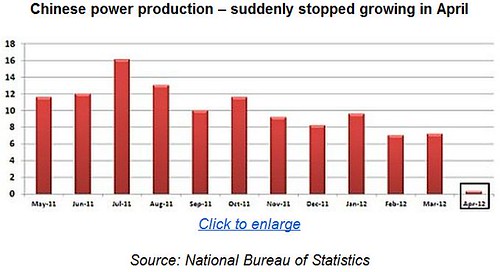
The coal price ($98.35) is another commodity that has slumped.

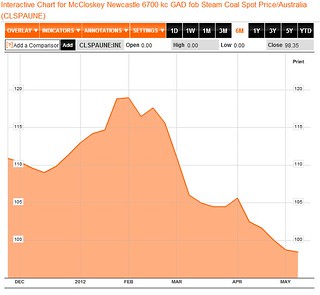
Aus ToT are going to look pretty sick next quarter. I can see all this becoming a death spiral trapped in a negative feedback loop.
Freckle, agree with you. I work a lot in China. Things are starting going from unpredictably bumpy to consistently negative. Many small/mid size companies doing it hard, while BIG guys are still flat out busy (talking about two speed economy).
Unless world consumption grow next 12 months, China will slow down to another level of gearing – not pretty for Aussie.@jpcashflow, agree 100%. Many mates I was drinking with in mine 20s took different path in life and still balance family budged +/- $50/week. While I was non-educated, poor kid out there back then, I now enjoy financial freedom and little care if I still have a job next week. Nothing special, just a CHOICES I made. Exactly what you mention here. You do not really need to be brilliant, just reasonable and you will do fine.
As about today’s times, I am very excited. Great to live in turbulent world and flex your brain to see if you can make a dollar along the way





It’s early days yet bit it appears Chinese mills are delaying or cancelling orders for coal and ore.
http://www.cnbc.com/id/47498211
I notice that LME stockpiles are rising.. nicker for example

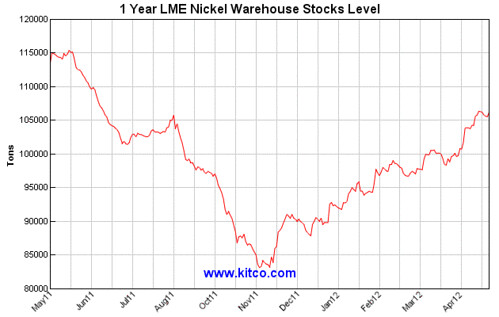
Fe @ 62% was US$145/dmt on 1 May. It’s slumped to US$130/dmt

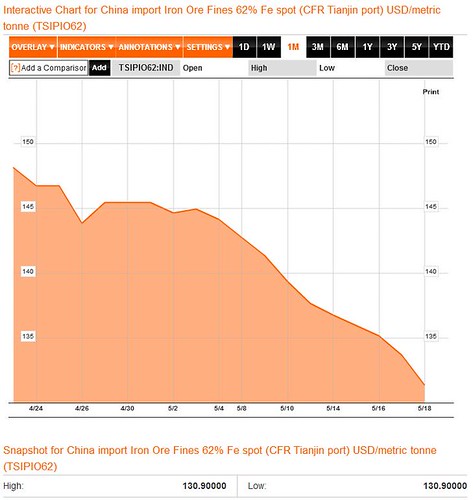
Coal is looking decidedly shaky. That has implications for the East Coast especially QLD

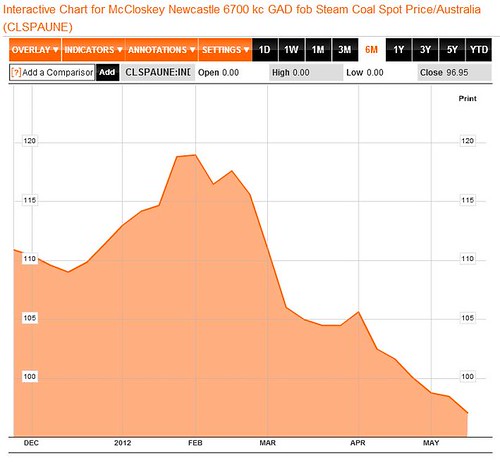
The monthly volume volatility is concerning.


Even more concerning is the massive percentage of export earnings these commodities represent


China, which now receives around 30% (or $7 billion per month worth) of Australia’s total merchandise exports, up from only 5% in 2000:
The question I ask myself is; are commodities returning to trend given global growth is seriously impaired and likely to be for the foreseeable future?
the chinese cancelling coal orders will not be good for the various mining economies – and could have negative impacts for investment properties in those areas too. i will keep an eye out for what's happening in china regarding demand for australia's resources
mattsta wrote:the chinese cancelling coal orders will not be good for the various mining economies – and could have negative impacts for investment properties in those areas too. i will keep an eye out for what's happening in china regarding demand for australia's resourcesBoth India and China are developing energy policies that reduce their dependence on coal
Milne said China and India were openly discussing moving away from coal.
http://articles.economictimes.indiatimes.com/2012-03-19/news/31210665_1_coking-coal-iron-ore-indian-steelGas is taking center stage as the energy source of choice given its eco profile (compared to coal) and it’s cost. If anything I expect to see pressure exerted by green groups and government to grow the gas industry at the expense of the coal industry over the coming decades.
Some coal stats
Exports
Black coal is Australia’s second-highest export commodity and Australia is the world’s leading coal exporter.Over the past 10 years black coal exports have increased by more than 50%.
Japan takes 39.3% of Australia’s black coal exports – the largest share, with a total of 115.3 million tonnes exported last financial year.
China is our second largest market with 42.4 million tonnes in 2009-2010, almost double the previous year.
The Republic of Korea accounts for 40.7 million tonnes, India for 31.92 million tonnes and Taiwan for 26.53 million tonnes, rounding out the top five destinations for coal from Australia.
Together these five countries accounted for 88% of all black coal exports with a further 28 countries taking the remaining 12%.
Demand for coal in China and India is expected to increase dramatically over the next decade in line with these countries’ projected need for coal for energy and manufacturing.
Australia was the only one of the world’s 33 advanced economies to grow in 2009 during the worst global recession since the Great Depression.
The principal reason for this was our continued coal exports. The importance of coal in the economy is also evident in its growing share of Gross Domestic Product.
This share has more than doubled, from 1.7 % in 2006-07 to 3.5 % in 2008-09, making it the largest contributor to the mining sector.
http://www.australiancoal.com.au/exports.htmlThis just in from MB
Chinese Defaulting on Bulk Contracts
http://www.macrobusiness.com.au/2012/05/chinese-defaulting-on-bulk-contracts/I can see this getting really ugly very fast. I’ve argued for well over 18 months locally that expansion of mine capacity in the Pilbara region alone would exceed all of China’s seaborne demand by at least 100mtpa. Add to that supply from other regions of Australia and supply coming on stream from international sources and I couldn’t see anything but a recipe for disaster.
China’s going to try and bring forward infrastructure projects because their economy isn’t just heading for a hard landing it’s actually stalling big time.
http://www.macrobusiness.com.au/2012/05/here-comes-the-chinese-stimulus/You know when you hit the brakes and then miss a gear to get moving again… to me that’s China but they’ve picked too low a gear and slowed down even more to stalling speed. I think they’ve just snapped an axle trying.
This has the makings of one big balls up.
Freckle wrote:Both India and China are developing energy policies that reduce their dependence on coalThis is a worldwide phenomena that is occurring in many countries and is part of the quest for more efficient energy sources. Its called de-carbonisation and it has been taking place over time with the transition from wood to coal to oil and now to gas. Each new phase has fewer carbon elements which means a higher ratio of hydrogen. This gives you more bang for your buck and has a side benefit of being cleaner ie less carbon emitted from the combustion process. The logical conclusion of this series of transitions will be the Hydrogen Based Economy.
This does not result in a step change and the transitions happen over many years and is more of a gradual process whereby the new entrant takes up market share and then a point is reached where it overtakes the previous energy source in terms of usage.
Nuclear will also have a bigger slice of the energy market in the future. The steam by product from nuclear power generation can also provide a very efficient means to reform methane gas and produce pure hydrogen ie a methane gas line loops into a nuclear plant and the output is pure hydrogen.
In all of the future energy demand scenarios Australia looks like it will continue to be a major source of raw energy resource supply to the worldwide market.
bardon wrote:This does not result in a step change and the transitions happen over many years and is more of a gradual process whereby the new entrant takes up market share and then a point is reached where it overtakes the previous energy source in terms of usage..
Shale gas is the fly in the ointment so to speak. Since the mad dash to uncover shale gas deposits in the US the industry has gone ballistic. The sheer quantity of gas being bought on stream is literally displacing coal and oil (heating, generating etc) at never before seen rates. The price crash in gas is making coal even less competitive
The downward pressure in coal prices is almost totally blamed on displaced coal markets in the US seeking new customers in China. in India’s case transport infrastructure is limiting their coal distribution capability (most mining is in the north). Even at higher prices it easier to import coal and deliver it to ports near their markets. The flip side to that is that lack of infrastructure invites building a gas infrastructure as a priority over a coal infrastructure if you’re going to reduce dependence on coal anyway.
Coal isn’t going anywhere soon. I think there’s something like 300 yrs supply of the stuff at current rates of consumption. What I can see in the future though is different processing practices to turn coal into other products like gas and liquid fuels.
I think you’ll find that gas will displace coal faster than most think. If you look around investment markets shale gas is seen as the hot play of the day to be involved with even with a relatively low price compared to a few years ago. It is more likely to attract investment capital than coal.
Australia has some potentially large shale gas fields located in the outback. It’ll be interesting to see how those develop over the coming years. Maybe the new mining towns of the future.
HSBC’s take on Australia’s future re LNG etc…..
bandwagon wrote:HSBC’s take on Australia’s future re LNG etc…..I wouldn’t argue with any of the facts and figures in that report. Loved the chart on energy consumption and where India and China sit relative to other developed countries. It’s very similar to their protein consumption which again bodes well for oz given that we are an exporter of food. Let’s not forget that in China we have seen 150m peasants move up the economic chain to now have a disposable income, over the last twenty years. There is at least another 350m more about to do this at a faster rate. What will happen in India is mindboggling as they have not had any development since the days of the Raj relatively speaking, they will make the China growth story look like a training course in comparison.
I would say though, that their statement that we may see too much LNG is something that I think is a will. For example the UK basin that has now had clearance from the scientist for extraction will keep the UK self-sufficient for x years, which will mean that their dependence on imported LNG will drop. From the earliest of times it has been demonstrated that hydrocarbon will always beget more hydrocarbon. We are seeing this now with the methane revolution and we will see much more of this going on around the world. Not that this is a problem as an ever more abundant and cheaper sources of energy is what continued economic growth and human development must have to continue. I would go as far as to say that the jury is out as to whether hydrocarbons are a finite resource. There are studies of a from of hydrocarbon upwelling at the deep sub-sea bases of continental shelfs that are showing traces of a hydrocarbon freely flowing out of the bases.
Gas is the way!!!!
Need to start by buying gas shares!!!
Jpcashflow | JP Financial Group
http://www.jpfinancialgroup.com.au
Email Me | Phone MeYour first port of call in finance :)
JPCashflow, I have seen some serious wealth made in the gas equities area but it was in the noughties. I am sure there is still opportunity out there especially with the smaller players that are now being hunted down for acquisition by the bigger players.
Home prices drop despite rate cut
- by: LISA ALLEN
- From: The Australian
- June 01, 2012 10:47AM
AN aggressive interest rate cut failed to halt a 1.4 per cent plunge in capital city residential values in May, according to researcher RP Data-Rismark.
For the year, residential values dropped 5.3 per cent, with Melbourne contributing the worst performance, given its property prices dropped 2.7 per cent in May. Darwin dwelling values slid 2.4 per cent.
Apartment prices fared better than houses and the premium market suffered more than most.
"Premium dwelling values have fallen by 6.1 per cent over the 12 months ending April 2012 while dwelling values at the affordable end of the spectrum are down by just 1.5 per cent,'' Tim Lawless, senior economist with RP Data, said.
"Unit values across the combined capitals increased in May and they are up 1.3 per cent over the first five months of the year."
Sydney property prices slumped 1.2 per cent in May to record a median dwelling price of $555,000.
Of the capitals, Adelaide was the best performer with a 1.2 per cent increase in prices to a median of $370,000.
The trend in house prices suggested there was more room for the Reserve Bank of Australia to cut interest rates, Mr Lawless said.
You must be logged in to reply to this topic. If you don't have an account, you can register here.




